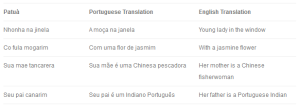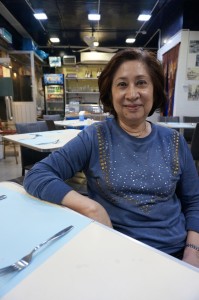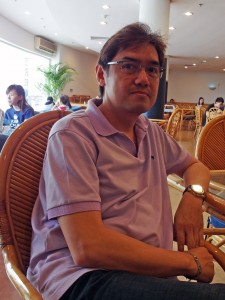By Aries Un, Katrina Lio, Karen Chang, Zoe Lai
The headline, “Do you understand me”, is written in Patuá, a language that was once widely spoken among the Macanese community, but no longer holds its unique status in this modernized city. Serving as both a means of communication and a carrier of culture, a language has its own venerable history and nature. The diversity of one language reflects the multi-ethnic nature of the society from where it derives. However, quite many languages are virtually on the verge of extinction. Patuá is among them struggling to fight for a breath.
Endangered language
“I am afraid that no one will know Patuá in the future,” said Sonia Palmer, a Macanese owner of a Portuguese Restaurant.
Patuá, also called by its speakers Papia Cristam di Macau (“Christian speech of Macao”) and dubbed as Dóci Língu di Macau (“Sweet Language of Macao”), is a special dialect only spoken by a few families nowadays in the region. “My parents taught me Patuá when I was small. And I used to speak Patuá with my family and some Macanese friends,” said Palmer. “However, the new generation of Macanese barely uses it.”
According to The United Nations Educational, Scientific and Cultural Organization (UNESCO), there is only a minority of 50 fluent Patuá speakers recorded in 2000. The creole language is listed as the fifth lowest degree of endangerment indicating a level “close to extinction”. Given that, the Macao SAR Government designated Patuá as part of the territory’s “intangible cultural heritage” in 2012. To Palmer, it cannot be more encouraging to Macanese like her as such a move implies a certain degree of “recognition” of the language.
History of Patuá
The Macao creole is a multicultural language spoken by the Portuguese descendants in the city for over four centuries. It can be traced back to the 16th century when Portuguese traders explored a maritime route from Europe to eastern continents and places, such as Africa, India, Malacca, and ultimately inhabited in Macao.
The language has gradually evolved into a unique creole based on the Portuguese language along with a combination of Malay, Cantonese, English and Spanish following the intermarriages between Portuguese settlers and local women which formed a Macanese community in the territory.
The fading of Patuá
One of the key reasons for Patuá’s downfall is due to a policy enforced at Portuguese-language schools in the 19th century discouraging the use of Patuá, which was considered as an inferior language. “When public education became more common,” said Palmer, recalling the old memories. “Patuá was not very welcomed as it was not a ‘standard language’. During that period of time, Portuguese teachers taught original and formal Portuguese. Therefore, the officials thought that Patuá would somehow distort what children were learning from schools.”
The creole language then declined into a women’s language since the early 20th century. Generally, Patuá was used in homes and sometimes on the street, but no more in schools or workplaces.
The Portuguese enclave returned to China after the handover in 1999. Driven by the flourishing gaming industry and implementation of the individual tourist scheme, there was a 14.7% surge in Mandarin speakers while the number of Portuguese speakers dropped by 0.6% ac- cording to a report by the city’s Statistics and Census Service (DSEC) in 2011. Along with the decline of Portuguese language, Patuá seems to be even more irrelevant to the communities nowadays.
Dóci Papiáçam di Macau
With a view to reviving the fading language in the city, Palmer mentioned that there is a theater group called Dóci Papiáçam di Macau trying to continue the language by performing dramas. Founded in 1993, the theatre company has made its mark in the Macao Art Festival since 1997.
The performing group holds at least one performance each year, according to Palmer, who is also among the group members. “We speak Patuá, English, Cantonese and Mandarin on stage; audience will understand part of our language, which is quite funny.” She added that not just Macanese who come for their show, there is also other-language-speaking audience who enjoy the multi-cultural yet entertaining story.
Preservation of Patuá
Senior Instructor of the English Language Centre, University of Macau, Manuel António Noronha, has devoted a lot of his time to research on the endangered creole language.
Despite increasing efforts to help promote and preserve the language, members of the dwindling Macanese com- munity and the Macau government face an arduous task in an attempt to increase the awareness among the younger generations.
Noronha grew up in Hong Kong under British rule, and naturally he found it quite interesting to hear his parents speak a foreign language among their friends and family. However, when he began learning Portuguese at the university, he found it quite intriguing that his parents spoke ‘Portuguese’ quite differently from his professors. This was when he began his interest in sociolinguistics, especially studies in pidgins and creoles.
He has resided in both Macao and Portugal. His research has also enabled him to speak Patuá. In fact, part of his doctoral dissertation focused on the historical profile of “Macao Portuguese”.
Noronha agreed that Patuá very much represents the Macanese identification. Other factors that have traces of Patua are: “Food, music, dress and dances, all of these you will find traces of Patuá.”

An untitled poem written in Patuá and translated into Poruguese and English. (By an unknown author)
He also gave an example in daily life which most of us might find familiar, “take a look at the word ‘min- chi’. It was infused into the language with influences from English. Do people know this word? No, not really but they eat it. So that means the culture here is very much embedded. The language is here, so the food is still here.”
However, Noronha believes that promoting the creole language to a declining number of speakers, with little interest in learning Portuguese among the younger generations of the Macanese community, is a problematic issue that faces advocates of the creole. “Even the locally born Macanese youngsters don’t want to learn Portuguese. If they don’t want to learn Portuguese, why would they be interested in a language that existed until the turn of the 20th century?” He also noted that the mandatory education of Standard Portuguese at schools at that time might have re- shaped the thinking of many people in the Macanese community. Why would they continue to learn and use the creole language as people would prefer the elite language over an ‘unrefined’ vernacular.
The archaic creole language can hardly keep up with the modernized society nowadays with minimal speakers. It accounts for its only appearance in theatres and dramas as a vehicle for critical parody, Noronha said. Asked if he would teach his children Patuá, he said he did so just to let his kids know the difference between standard Portuguese and the creole language. “Sometimes they would imitate me. Very rarely would they speak Patuá with another friend. They found it extremely funny and they think it was a joke. If I explained, they would listen or sometime they would say ‘I see’. That’s it,” he also added.


